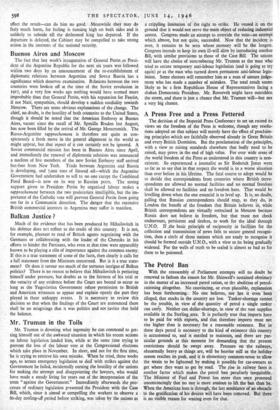Mr. Truman in the Toils
Mr. Truman is devoting what ingenuity he can command to get- ting himself out of the awkward situation in which his recent actions on labour legislation landed him, while at the same time trying to prevent the loss of the labour vote at the Congressional elections which take place in November. In short, and not for the first time, he is trying to retrieve his own mistake. When he tried, three weeks ago, to secure emergency legislation to deal with strikes against the Government he failed, incidentally earning the hostility of the unions for making the attempt and disappointing the lawyers, who would have made a steady living for years out of the interpretation of the term " against the Government." Immediately afterwards the pro- cesses of ordinary legislation presented the President with the Case Bill, which, since it aimed at compelling the workers to observe a 6o-day cooling-off period before striking, was taken by the unions as a crippling limitation of the right to strike. He vetoed it on the ground that it would not serve the main object of reducing industrial unrest. Congress made an attempt to override the veto—an attempt which almost, but not quite, succeeded. Now that the incident is over, it remains to be seen whose memory will be the longest. Congress intends to keep its own ill-will alive by introducing another Bill, with similar provisions to those of the Case Bill. The unions will have the choice of remembering Mr. Truman as the man who tried to secure temporary anti-labour legislation (and is going to try again) pr as the man who turned down permanent anti-labour legis- lation. Some electors will remember him as a man of unsure judge- ment who has made a number of mistakes. The total result seems likely to be a firm Republican House of Representatives facing a shaken Democratic President. Mr. Roosevelt might have outridden the storm, and there is just a chance that Mr. Truman will—but not a very big chance.






























 Previous page
Previous page